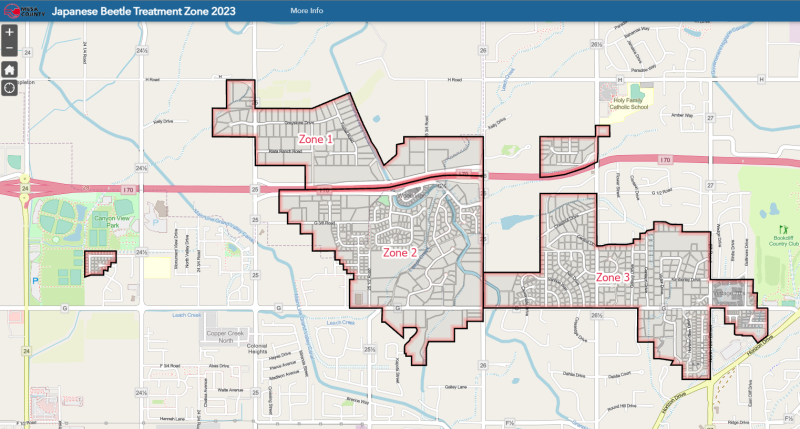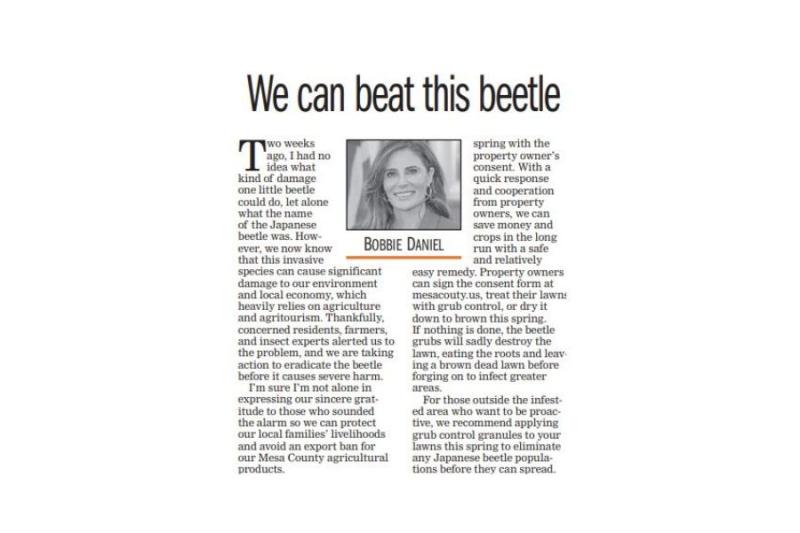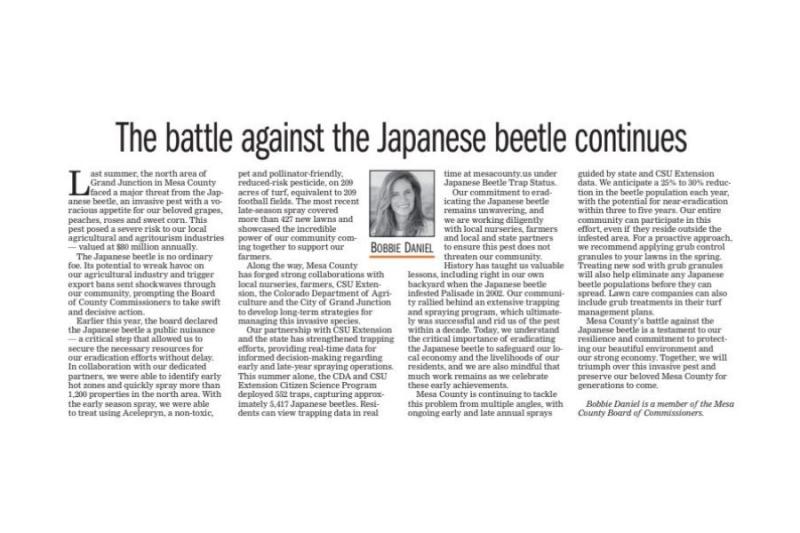Japanese Beetle Eradication
Mesa County successfully treated over 1,200 properties with Acelepryn, a safe pesticide, spanning an area as vast as 209 football fields. Our Japanese Beetle eradication efforts are steadfast, bolstered by partnerships with nurseries, agricultural experts, and government bodies.
With annual strategic treatments, we're on track to reduce the beetle population from 25 to 30% yearly, aiming for total eradication in three to five years.
We're proud to report the deployment of 552 traps through the Colorado Department of Agriculture (CDA) and CSU Extension Citizen Science Program, leading to the capture of 5,417 beetles. To stay informed, visit mesacounty.us for real-time trapping data.
You can still join the fight outside the hot zone area. To do your part, apply grub control to your lawns in spring and treat new sod to hinder beetle spread.
Infestation Area

Japanese Beetle Treatment Zone interactive map
- The borders of the general infestation are 24 Road and Horizon Drive between G Road and H Road.
- Properties outlined in red are subject to eradication efforts.
- Homeowners in this area will be contacted to give their consent for Mesa County to complete free Japanese Beetle grub control treatments on their lawn.
Eradication Plan
Mesa County Commissioners have declared Japanese Beetle as a public nuisance pest requiring control or eradication.
- Noxious Weed and Pest Management is working with industry and government entities to implement eradication efforts and support property owners.
- County has approved funding to cover the cost of grub control treatments in the area where a Japanese Beetle infestation has been identified.
Grub Control Treatment
- Public parks in the City and County will receive grub treatments.
- Property owners in the infestation area will be sent an informational letter and consent form to allow grub control treatment on their property.
- County will approve a contract for turf management companies to complete treatments in the infected area.
- Turf management companies will include grub control in turf management plans for current customers in the infested area. The cost of these treatments will be reimbursed by Mesa County.
- The first round of Mesa County funded grub treatments will occur during the months of April-June.
- Mesa County funded treatments will be completed by a licensed and registered commercial applicator.
- Follow up grub treatments may occur in August and September.
Information and Resources
- Property owners outside of the infestation area can prevent Japanese Beetle establishment in their area by completing grub control treatments with homeowner formulations or contacting a local turf management company.
- Educational support is being provided by Colorado State University Extension Services.
- Subscribe to the Mesa County Agricultural Updates.
This instructional video will guide you through applying grub control granules.
Homeowners' Resources
licensed_commercial_applicators_for_lawn_care.pdf
Japanese Beetle in Mesa County - English Version.pdf
Japanese Beetle in Mesa County - Spanish Version.pdf
Colorado State University Extension Information
- Tri-River Area Colorado State University Extension
- Japanese Beetle Fact Sheet from Colorado State University Extension
Trapping and Monitoring
- Japanese Beetle Trap Status
- Trapping and monitoring are being provided by the Colorado Department of Agriculture.
- Homeowners can consent to have a monitoring trap placed on their property by completing the Consent Form.
- Trapping completed in 2023 will inform ongoing eradication plans.
- We can begin to determine effectiveness of treatments based on 2023 and 2024 trapping numbers.
- Japanese Beetle traps allow us to track beetle populations as they change over time.
- A robust network of traps allows us to make informed decisions about future eradication efforts.
- You can help us manage the spread of Japanese Beetle by allowing a trap to be placed on your property.
- Please use the consent form to sign up for the trapping program.
- Note: Traps will be placed where they are needed to collect monitoring data, so every property may not receive a trap.
Frequently Asked Questions
- The Japanese Beetle is an invasive insect that causes over $460,000,000 worth of damages per year in eastern states.
- It feeds on over 300 species of desirable plants including grapes, peaches, roses, apples, sweet corn, trees, and turf grass.
- This pest is well established east of the Rocky Mountains which are a natural barrier to their spread.
- It is not established in the western states, and its movement is regulated by state and federal quarantines which prohibit the movement of infested plant materials to unaffected areas.
- When populations are discovered in western states they must be eradicated to prevent further establishment.
Images and detailed information about Japanese Beetle biology can be found on the “identification” page.
- Mesa County has secured initial funding to complete grub control treatments on all irrigated turf in the infested area.
- We will be seeking property owner consent to treat their lawns and eradicate Japanese Beetles in the grub stage.
- We are working with CSU Extension and the Colorado Department of Agriculture to promote awareness and expand opportunities for eradication efforts.
- This will be a multi-year effort.
- Mesa County will work with our partners to expand management options for homeowners.
In short, everyone in Mesa County!
- The Japanese Beetle feeds on a wide variety of plants that improve our lives. The spread of this beetle will affect everybody, whether you're growing 100 acres of peaches or have a small lawn and a rosebush.
- Japanese Beetles will damage or kill irrigated turf in lawns, parks, and golf courses as a grub.
- Property owners will see damage to turf from April-October.
- The adult beetles emerge and feed on many desirable ornamental and agricultural plants throughout the summer months.
- Adult beetles will destroy vegetable gardens, ornamental plants, and trees.
- Fruit growers will experience crop losses and increased production costs due to Japanese Beetle damage.
- We want to eradicate the Japanese Beetle to protect our economy and the quality of life for our residents.
- If this beetle spreads to our fruit growers it will decimate the agricultural production of Mesa County.
- This industry is one of the primary drivers of our economy.
- Such a large impact to fruit and wine production will have secondary effects on our tourism, plant exports, and retail industries.
- Japanese Beetles will impact residents by destroying lawns, gardens, and trees on landscaped properties.
- Additionally, they swarm and feed in groups on desirable plants. In this regard they can be a very unpleasant pest to have on your property.
Please contact Mesa County at 970-902-9336 or jb@mesacounty.us and continue to follow us for updates.
- You can be proactive and complete grub control treatments on your lawn.
- Information about homeowner applied treatments is available in the “Homeowner Resources” section of this page.
- You can also request preventative grub control treatments from a lawn care company.
If you are experiencing damage to turf and ornamental plants this season and find adult Japanese Beetles, please contact CSU extension services to confirm the identification.
- Acelepryn is a reduced risk pesticide that provides long lasting grub control when applied from April-June.
- When it is applied correctly, it is considered safe to use around humans, pets, birds, bees, and other pollinators.
News
Public Notice: Noxious Weed Treatments at Clifton Nature Park & The Ponds
October 31, 2024
County begins restoration treatments in wetland area near Riverfront Trail by 30 and C 1/2 roads
October 16, 2024
Op-Eds

By Bobbie Daniel
Two weeks ago, I had no idea what kind of damage one little beetle could do, let alone what the name of the Japanese beetle was. However, we now know that this invasive species can cause significant damage to our environment and local economy, which heavily relies on agriculture and agritourism. Thankfully, concerned residents, farmers, and insect experts alerted us to the problem, and we are taking action to eradicate the beetle before it causes severe harm.
I’m sure I’m not alone in expressing our sincere gratitude to those who sounded the alarm so we can protect our local families’ livelihoods and avoid an export ban for our Mesa County agricultural products.
If the beetle is not dealt with properly, it will affect many woven economic layers in the fabric of our community, since this industry affects more than meets the eye. Ag and ag-tourism bring in approximately $80 million annually, not to mention the value of interconnected peripheral sectors.
The Japanese beetle feeds on grapes, peaches, sweet corn, trees, turfgrass, and ornamental plants. If it establishes and goes unchecked, it will cause severe damage to local farms and landscaped properties, and the spread of this beetle will affect everyone.
At a public hearing last week, our Board of County Commissioners declared the Japanese beetle a public nuisance to allow us to quickly secure the products we need to begin eradication efforts in early spring and attract more funding partners. We have an immediate plan of action, and starting in April, we will focus on treating the infested area in the Grand Junction North area by assisting approximately 1,200 property owners from Canyon View Park to Bookcliff Country Club with a chemical called Acelepryn, which is an effective reduced-risk pesticide — a non-toxic insecticide safer than dish soap, according to the U.S. Environmental Protection Agency.
We can treat this area this spring with the property owner’s consent. With a quick response and cooperation from property owners, we can save money and crops in the long run with a safe and relatively easy remedy. Property owners can sign the consent form at mesacouty.us, treat their lawns with grub control, or dry it down to brown this spring. If nothing is done, the beetle grubs will sadly destroy the lawn, eating the roots and leaving a brown dead lawn before forging on to infect greater areas.
For those outside the infested area who want to be proactive, we recommend applying grub control granules to your lawns this spring to eliminate any Japanese beetle populations before they can spread. Lawn care companies can also include grub treatments in their turf management plans.
We understand that eradicating the Japanese beetle is critical to protecting our local economy and the livelihoods of our residents. We are working with farmers, CSU Extension, the Colorado Agriculture Department, and local government entities to develop long-term strategies for managing this invasive species.
With everyone’s efforts and our community working together, we can save Mesa County from the potentially catastrophic economic impact of the Japanese beetle.
Our historical evidence demonstrates that local initiatives have effectively managed the beetle’s spread. When the Japanese beetle infested Palisade in 2002, an extensive trapping program was implemented in 2003 along with a robust and proactive campaign, resulting in the successful eradication of the pest and the restoration of beetle-free conditions in the region by 2009.
For more information and to sign up for free treatment in the infested area, please visit mesacounty.us, email weed.pest@mesacounty.us, or call 970-255-7121.
Bobbie Daniel is a Mesa County Commissioner representing District 2.

The battle against the Japanese beetle continues
By Bobbie Daniel
Last summer, the north area of Grand Junction in Mesa County faced a major threat from the Japanese beetle, an invasive pest with a voracious appetite for our beloved grapes, peaches, roses and sweet corn. This pest posed a severe risk to our local agricultural and agritourism industries — valued at $80 million annually.
The Japanese beetle is no ordinary foe. Its potential to wreak havoc on our agricultural industry and trigger export bans sent shockwaves through our community, prompting the Board of County Commissioners to take swift and decisive action.
Earlier this year, the board declared the Japanese beetle a public nuisance — a critical step that allowed us to secure the necessary resources for our eradication efforts without delay. In collaboration with our dedicated partners, we were able to identify early hot zones and quickly spray more than 1,200 properties in the north area. With the early season spray, we were able to treat using Acelepryn, a non-toxic, pet and pollinator-friendly, reduced-risk pesticide, on 209 acres of turf, equivalent to 209 football fields. The most recent late-season spray covered more than 427 new lawns and showcased the incredible power of our community coming together to support our farmers.
Along the way, Mesa County has forged strong collaborations with local nurseries, farmers, CSU Extension, the Colorado Department of Agriculture and the City of Grand Junction to develop long-term strategies for managing this invasive species.
Our partnership with CSU Extension and the state has strengthened trapping efforts, providing real-time data for informed decision-making regarding early and late-year spraying operations. This summer alone, the CDA and CSU Extension Citizen Science Program deployed 552 traps, capturing approximately 5,417 Japanese beetles. Residents can view trapping data in real time at mesacounty.us under Japanese Beetle Trap Status.
Our commitment to eradicating the Japanese beetle remains unwavering, and we are working diligently with local nurseries, farmers and local and state partners to ensure this pest does not threaten our community. History has taught us valuable lessons, including right in our own backyard when the Japanese beetle infested Palisade in 2002. Our community rallied behind an extensive trapping and spraying program, which ultimately was successful and rid us of the pest within a decade. Today, we understand the critical importance of eradicating the Japanese beetle to safeguard our local economy and the livelihoods of our residents, and we are also mindful that much work remains as we celebrate these early achievements.
Mesa County is continuing to tackle this problem from multiple angles, with ongoing early and late annual sprays guided by state and CSU Extension data. We anticipate a 25% to 30% reduction in the beetle population each year, with the potential for near-eradication within three to five years. Our entire community can participate in this effort, even if they reside outside the infested area. For a proactive approach, we recommend applying grub control granules to your lawns in the spring. Treating new sod with grub granules will also help eliminate any Japanese beetle populations before they can spread. Lawn care companies can also include grub treatments in their turf management plans.
Mesa County’s battle against the Japanese beetle is a testament to our resilience and commitment to protecting our beautiful environment and our strong economy. Together, we will triumph over this invasive pest and preserve our beloved Mesa County for generations to come.
Bobbie Daniel is a member of the Mesa County Board of Commissioners.


